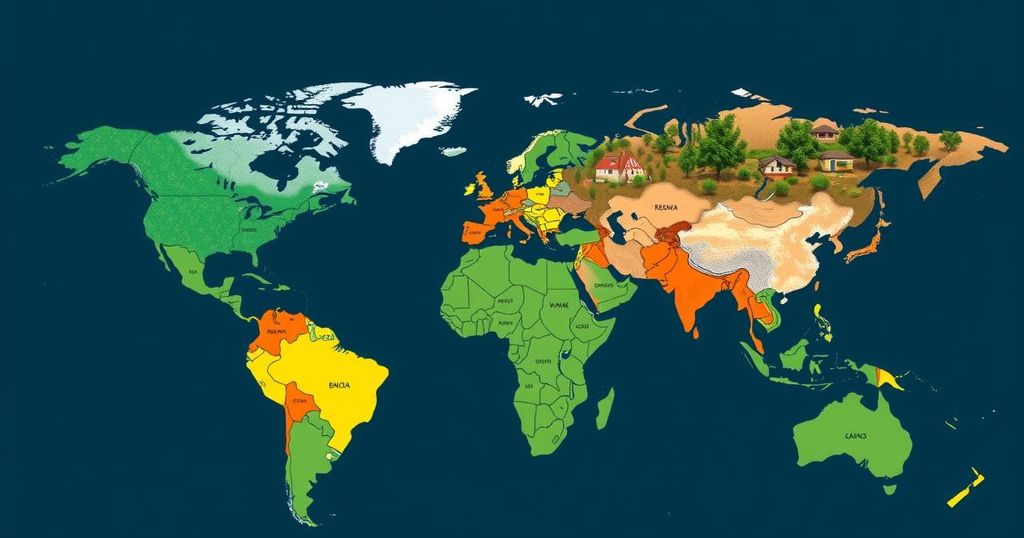Compensation Initiatives Emerge for Climate Change Damages in Developing Nations

Wealthier nations are beginning to compensate poorer countries for climate change damages through a newly established “loss and damage” funding mechanism. This initiative, highlighted by the experience of a Malawian farmer devastated by Cyclone Freddy, aims to support communities facing severe impacts from climate change. The program faces challenges as funds pledged by developed countries remain largely unallocated, while the need for assistance is anticipated to rise significantly in the coming years.
In recognition of the damages inflicted by climate change, wealthier nations are beginning to compensate poorer countries. This initiative, referred to as “loss and damage” compensation, aims to provide financial support specifically for climate-related disasters. Such support became noteworthy when Christopher Bingala of Malawi received approximately $750 after Cyclone Freddy devastated his region, displacing over 650,000 people. This fund has been initiated amidst the backdrop of ongoing climate change discussions, particularly concerning the obligations affluent nations have towards those they have disproportionately affected.
Cyclone Freddy, which struck in 2023, exemplifies the severe climate impacts faced by low-income countries that contribute minimally to global pollution but suffer significantly from its repercussions. At the latest COP29 climate summit, ongoing negotiations are addressing how much financial assistance should be provided to developing nations as part of a comprehensive climate finance strategy. Premier of the Commonwealth of the Bahamas, Philip Davis, urged wealthier nations to recognize and assume responsibility for their emissions and their consequences.
The compensation received by Bingala was facilitated by the Scottish government and administered by GiveDirectly, a non-profit organization focused on unconditional cash grants. For many, this payment served as critical support for reconstructing their lives, allowing families to rebuild homes, invest in agricultural inputs, or return children to school. As noted by GiveDirectly’s Yolande Wright, low-income households in developing nations typically possess fewer safeguards against climate-related adversities.
This pilot initiative in Malawi represents a potential model for a larger international system aimed at compensating vulnerable countries for climate-induced damages. Despite the progress made, there is still much work to be done; while promises totaling approximately $720 million have been made, the actual flow of funds remains limited. Furthermore, significant discussions are underway regarding the guidelines for fund distribution, especially as the demand for such funding is projected to escalate dramatically in the coming years. The pressing nature of this crisis underscores the imperative for efficient and effective responses from affluent nations, which will ultimately benefit them as well, due to the transnational nature of climate-related impacts.
The effects of climate change are disproportionately felt by low-income countries, which despite contributing the least to global emissions, are often the most vulnerable to extreme weather events such as hurricanes, floods, and droughts. As global temperatures rise, these nations are experiencing severe weather patterns that lead to significant loss of life, livelihood, and infrastructure. The recent establishment of a financial compensation mechanism aims to address these disparities, compelling wealthier countries to financially assist those nations suffering from the direct impacts of climate change. Such funding not only helps in rebuilding and recovery efforts but also aims to provide a long-term strategy to support these nations in adapting to ongoing climate challenges.
The burgeoning framework for loss and damage compensation illustrates a significant shift in global accountability regarding climate change. Efforts such as those initiated in Malawi highlight the urgent need for a robust financial system that not only compensates for damages but also facilitates proactive measures to protect vulnerable communities. As climate-related disasters escalate, the commitment from wealthier nations must intensify, not merely as an act of goodwill, but as a strategic move crucial for global stability and humanitarian wellbeing.
Original Source: www.wypr.org






